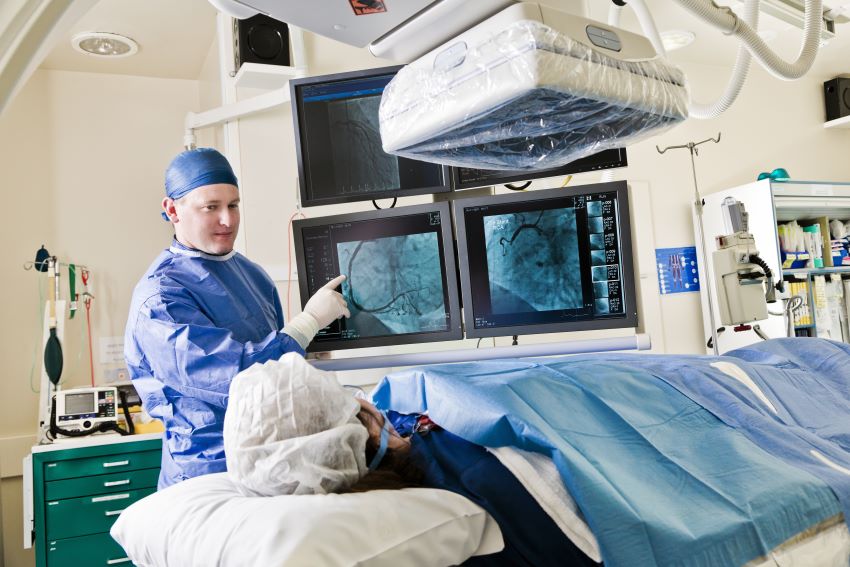Alabama
Alaska
Arizona
Arkansas
California
Colorado
Connecticut
Delaware
Florida
Georgia
Hawaii
Idaho
Illinois
Indiana
Iowa
Kansas
Kentucky
Browse Cardiac Cath Lab Travel Nursing Jobs by State
Cardiac Cath Lab RN Travel Nursing Jobs Nationwide
Cardiac Cath Lab Travel Nursing Guide
Cardiac catheterization lab RNs, most often called cardiac cath lab RNs, are at the heart of healthcare! There’s a consistent, high demand for cardiac cath lab nurses and other healthcare professionals to work in the cardiac catheterization lab unit, which creates lots of high-paying travel nursing and allied health jobs in various locations nationwide! If you’re a cardiac cath lab RN, tech, rad tech, or work another cardiac cath lab unit or related role, keep reading to learn more and explore nationwide job opportunities that just might be your perfect fit.
Cardia Cath Lab Careers
With a career as a travel cardiac cath lab RN, you can avoid nurse burnout while still sharing your marketable skills and much-appreciated talent with facilities nationwide that need your help the most. Of course, your work remains highly demanding, but with the various locations and facilities you can visit, travel nursing will help you stay fresh, motivated, and centered on providing great patient care. Travel nursing is also a great way to sharpen your skills, gain crucial experience, and improve your resume, while you explore the country and all the opportunities available to you!
What does a Cardiac Cath Lab Nurse Do?
The cardiac catheterization lab is a specialized hospital unit where a team of healthcare professionals provide testing and treatment for cardiovascular disease and related heart concerns and conditions. Some common tests and treatments that occur there include stents, rotoblations, pacemakers, PAD treatments, angiograms (cardiac catheterizations), balloon angioplasties, and other interventional procedures.
To succeed working in the cardiac cath lab, you must have a proven track record as a nurse as well as specialized training and experience in this area. Great cardiac cath lab nurses are able to function well within a multidisciplinary team, are excellent at monitoring and assessing patients for symptoms of cardiovascular disease, are great communicators, are highly organized, and are always ready to respond quickly with emergency interventions.
The cardiac cath lab team’s ultimate goal is to assist/execute testing for patients with (or who are suspected to have) cardiovascular disease and other heart conditions, and to help treat and stabilize patients with cardiac emergencies. The hope is to get them tested/treated and moved to another hospital unit for continued care and, if possible, eventually be discharged.
Who Works in the Cardiac Cath Lab?
A multidisciplinary team of healthcare and administrative professionals work in the cardiac catherization lab unit. This team can include cardiac cath lab nurses, rad techs, other techs, interventional cardiologists, electrophysiologists, cardiac physiologists, radiologists, charge/clinical coordinators, surgeons, therapists, dieticians, nursing assistants, clinical pharmacists, clinical psychologists, occupational therapists, administrative staff, and social workers/case managers.
How is a Cardiac Cath Lab Nurse Different from a Cardiac Care Nurse?
Both cardiac cath lab nurses and cardiac care nurses are experts at heart rhythms and require expert knowledge of electrocardiography equipment and other such tools. They work with a similar patient population, and they’re commonly conflated. Cardiac cath lab RNs focus on various cardiac testing and complex procedures within the cardiac cath lab. Their work includes direct pre-operative patient prep, direct post-op recovery, monitoring, and treatment plan education for each patient and their family. A cardiac care nurse is focused on direct cardiac care for patients with moderate to severe cardiovascular disease. But they also work with both pre- and post-op patients, including assistance with treating cardiac diagnoses. Whether treatment is given in the cardiac cath lab environment or not is a good way to distinguish these similar yet separate roles.
Who’s Treated in the Cardiac Cath Lab?
Patients in the cardiac cath lab unit are either being treated for a cardiovascular illness or undergoing cardiovascular testing. If a doctor suspects a patient has coronary artery disease, a patient may be tested in this unit with an angiogram. On the other hand, patients may find themselves in the cardiac catherization unit due to an acute situation, such as a heart attack, which can arise from a variety of chronic or acute health concerns and/or situations.

Quick Cardiac Cath Lab Facts
- Commonly required cardiac cath lab RN education: Associate Degree in Nursing (ADN) and/or Bachelor of Science in Nursing (BSN), plus passing the National Council Licensure Examination (NCLEX)
- Commonly required cardiac cath lab certifications: Advanced Cardiovascular Life Support (ACLS), Basic Life Support (BLS)
- Commonly preferred cardiac cath lab certifications: Critical Care Registered Nursing (CCRN), Crisis Prevention and Intervention (CPI)
- Commonly required experience to become a travel cardiac cath lab RN: Facilities typically require a minimum of two years of recent, in-hospital experience in order to hire you as a cardiac cath lab travel nurse. To protect your license and preserve patient care, you’ll want the benefit of this experience!
- Average annual cardiac cath lab RN salary range: $78,500-$150,000
Locations where cardiac cath lab RNs are in high demand: Demand for cardiac catheterization lab RNs is growing nationwide! Locations like California, Connecticut, Hawaii, Washington, Wyoming, and Minnesota reflect high demand with higher average salaries for cardiac cath lab unit RNs in some of their cities.